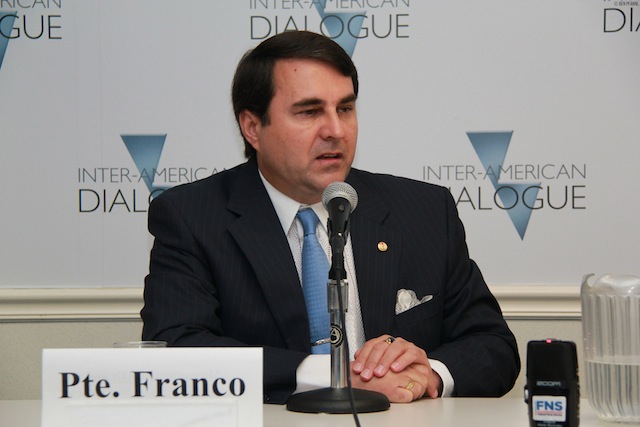Paraguay: No Big Deal

(Source: Flickr Account of Ben Pfannl)
By: Peter Tase, Guest Scholar at the Council on Hemispheric Affairs
On April 4, 2013, Paraguay’s departing president, Dr. Federico Franco Gómez, met with the leadership of one of Washington’s lobbying firms, the Livingston Group (L.L.C.), headed by former Colorado Senator Wayne Allard (R). During the discussion, President Franco shared his views on his country’s “business-friendly environment and its bright future.” The central themes of the gathering were Paraguay’s abundant resources and the need to achieve continuous economic growth by attracting a stream of foreign investors to exploit untapped prospects such as the exportation of aluminum and soy. The president drilled away at several pro-business features of the country. These included a 12 percent value-added tax (VAT), a young working force (70 percent of the population is below 30), a low debt burden (12 percent of GDP), and $6.4 billion USD in foreign reserve holdings. President Franco was boundlessly optimistic about his country’s economic future. He pointed to the “constant improvement of [Paraguay’s] education system, and an increase of U.S. investments in the under developed rural areas.” The president concluded by suggesting that increased trade would “turn Paraguay into a world power.”
The Livingston Group team was invited to continue its conversation with Paraguayan authorities in Asunción, the nation’s capitol. President Franco, did not, however, put all of Paraguay’s eggs in one basket. He also held meetings with partners of Covington and Burling LLP lobbying firm, which included former Assistant Secretary of State Arturo Valenzuela (now one of the firm’s consultants).
Franco’s trip was not an unqualified success. During his two day official visit, Franco did not meet with any senior State Department officials, and ended his trip with a formal address before the OAS Permanent Council, which was attended by representatives of only 13 nations. Those not in attendance perhaps recalled the fact that he arrived in office by extra-constitutional means and that not even Washington, let alone the Mercosur Nations, smothered him with attention. In truth, Paraguay has a long way to go to be received in an unqualified manner.
Peter Tase is a Guest Scholar at the Council on Hemispheric Affairs.
Please accept this article as a free contribution from COHA, but if re-posting, please afford authorial and institutional attribution. Exclusive rights can be negotiated.
For additional news or analysis on Latin America, please go to: Latin News

